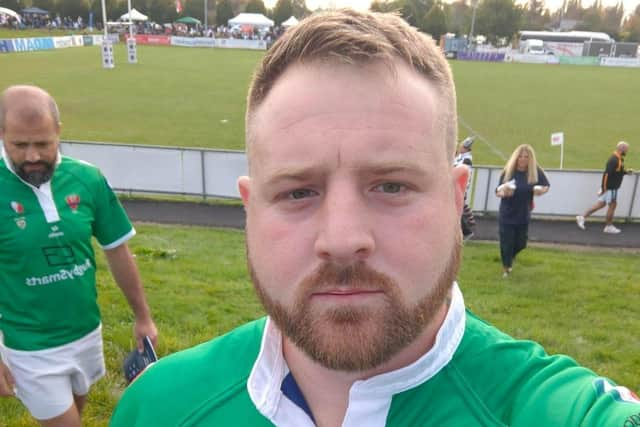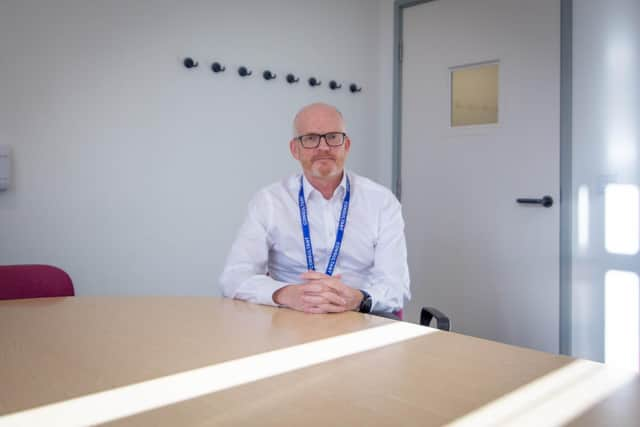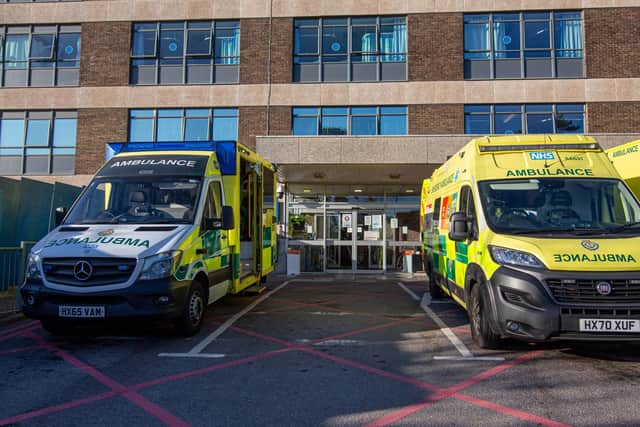Hayling Island engineer left suffering with pain daily after delayed rare spinal condition diagnosis
and live on Freeview channel 276
James Booth has had to endure ongoing bowel and bladder problems associated with cauda equina syndrome. The affliction occurs when the nerves at the bottom of the spinal cord are compressed and damaged.
Following a delayed diagnosis and operation, Mr Booth, of Hayling Island, has had to suffer from daily side-effects since – with the pain expected to last for rest of his life. He said: “The pain I felt the day I was taken to hospital was unbearable, and not being able to walk was the most terrifying feeling.
Advertisement
Hide AdAdvertisement
Hide Ad"To this day, I still remember it so vividly. Once I was in the hand of the medics, I trusted everything was going to be fine and I’d be fit and well again in no time. Sadly and frustratingly, it didn’t go that way.”


Mr Booth was taken by ambulance to Queen Alexandra Hospital in Cosham on June 16, 2018, after being left unable to walk due to extreme back and leg pain. He underwent an MRI scan that afternoon, but no issues were reported.
Following the appointment, he began suffering bowel issues and felt numbness in his groin area – with his legs going numb on June 18 at 5pm. A few hours later, he was back in hospital. His condition was re-reviewed – where it was suspected he had cauda equina syndrome – and transferred to another medical facility for emergency spinal decompression surgery the following day.
The medical procedure took place at roughly 8am on June 19. Since the surgery, the 33-year-old has been forced to give up his job as a water treatment engineer.
Advertisement
Hide AdAdvertisement
Hide Ad

More than five years after being diagnosed, Mr Booth contacted medical negligence experts at Irwin Mitchell to investigate his care under the Portsmouth Hospitals University (PHU) NHS Trust – deciding whether he should have been diagnosed and treated sooner. It later transpired that the MRI scan was incorrectly reported and should have shown signs of cauda equina syndrome. Had the diagnosis and surgery happened sooner, Mr Booth wouldn’t be living with daily pain.
He said: “To then find out it could have been diagnosed when I was scanned was incredibly upsetting, as I could have been treated sooner and made a much better recovery. Instead, I’ve been left in pain every day and the issues with my bowel and bladder have been severely debilitating.
“It’s taken me a long time to come to terms with everything, and some days I still struggle to accept what’s happened. Thankfully, however, I’ve had the best support from my wife Jade, family and friends.
"The settlement also means that I don’t have to worry about being able to access any future treatment I need.”
Advertisement
Hide AdAdvertisement
Hide Ad

The NHS trust and Mr Booth’s legal team settled for £190,000. The money will be used fund ongoing access to the therapies and rehabilitation he needs.
Mr Booth has since been able to start his own building company to support his family, but he’s restricted from doing many physical tasks. Catherine Knight, the specialist medical negligence lawyer at Irwin Mitchell that represented Mr Booth, said: “James has been through an incredibly difficult time following his diagnosis, firstly being left with ongoing problems and then having to give up a career he enjoyed, leaving him concerned about how he was going to support his young family.
"While rare, cauda equina syndrome is an incredibly dangerous condition which can have devastating effects. Early detection and treatment are key to making as full a recovery as possible.
"Sadly, there’s nothing that can be done to change what James has been through, but we’re pleased to have helped secure him a settlement which will help ensure he has access to the treatment he needs to help him move forward with his recovery.
Advertisement
Hide AdAdvertisement
Hide Ad"It’s also vital that lessons are learned to help prevent others from suffering similarly in the future.” Ms Knight added that the PHU Trust admitted a ‘negligent delay’ in performing decompression surgery.
Dr John Knighton, medical director at Portsmouth Hospitals University NHS Trust, apologised to Mr Booth and his family and said patient care is the focus of everything they do. He said: “We are very sorry that the standard of care our patients rightly expect from us fell below those expectations on this occasion, and again apologise to Mr Booth and his family.
"The safety of our patients and staff is our top priority and we will continue working with colleagues to put measures in place, so such incidents do not happen again.”
As reported on the NHS website, the warning signs for Cauda Equina Syndrome is the loss of feeling or severe pins and needles in your inner thighs and the groin area, numbness around your buttocks, bladder and bowel related disturbances, not knowing when your bladder is either full or empty and other problems. Back pain and lower limb pain – known as sciatica – is also a warning sign.
Advertisement
Hide AdAdvertisement
Hide AdOn the University Hospitals of Derby and Burton website, they said: “If you experience any of these symptoms, please contact your Emergency Department straight away.” The NHS added that without early intervention, the possible consequences can be devastating, including irreversible damage to bladder and bowel function, and sexual dysfunction.